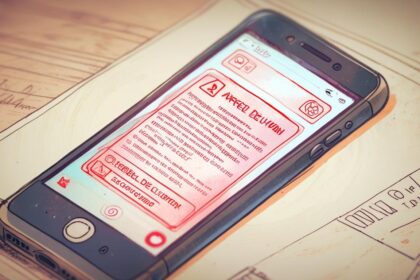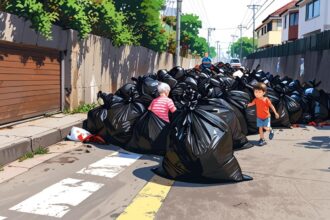The Scottish Qualifications Authority has come under fire after only 10% of bereavement-related exam appeals from students who sat their exams were successful, sparking concerns about fairness, transparency, and equity within its appeals process.
High Rejection Rates in SQA Bereavement Appeals Raise Concerns
The Scottish Qualifications Authority (SQA) has recently faced scrutiny over its handling of bereavement-related exam appeals, with an alarming 90% rejection rate for students submitting claims of bereavement affecting their exam performance. This statistic has sparked outrage among students and educators alike, highlighting significant concerns about the fairness and transparency of the appeals process.
The SQA introduced the Exam Exceptional Circumstances Consideration Service (EECCS) to allow students facing personal or environmental challenges to seek redress by submitting supplementary academic materials, such as preliminary exams and class tests. However, recent data indicates that only 10% of EECCS bereavement appeals were successful if the student attempted the exam, contrasting sharply with the approximately 80% success rate for students who chose not to sit the exam at all.
The appeal statistics reveal an even broader concern within the education community. In 2024, the SQA recorded 5,761 requests for the EECCS; only 38% of these resulted in changes to students’ grades. This low success rate has raised questions about how well the SQA’s criteria for evaluating appeals aligns with the needs of students experiencing loss or significant disruption.
Students who attempt the exam in the face of distressing personal circumstances tend to face a steep uphill battle. For those who sat their exams, the chance of successful appeals for reasons such as bereavement, medical conditions, or other personal issues plummeted to about 20%. This has led to accusations that the system disproportionately disadvantages those who try to persevere through challenging circumstances.
This sentiment has been echoed broadly by students and educational stakeholders. An SQA report evaluating the 2023 assessment and appeal process found that many felt the system was unfair and opaque, with only 37% of successful appellants viewing the process as fair. Compounding the issue, nearly half of the students surveyed reported a lack of clarity concerning the EECCS, which appears to be a significant barrier to effective support during an already stressful time.
The SQA’s claims of being the only UK exam board with such a service also come under scrutiny. While it emphasises its unique approach, the existence of a ‘special consideration’ service in England suggests that variations in support are not uniform across the UK, potentially leaving Scottish students at a disadvantage.
The 2024 figures reveal another troubling trend: requests for appeals based on examination disruptions were even less successful, with only 8% achieving grade alterations. Many of these appeals were either cancelled before reaching the final review stage or denied due to a lack of proper reporting of disruptions by invigilators. The SQA contended that in many cases, the reported issues were minor and addressed effectively during the exam.
Furthermore, inconsistencies in appeal success rates have emerged between different types of educational institutions. Independent schools reported a higher success rate of 12.8%, compared to just 9.8% for state schools, and 13.1% for further education colleges. These disparities raise critical questions about equity within the examination system, particularly regarding the benchmark support available for disadvantaged students.
Amid ongoing criticisms regarding the high rejection rates and a lack of clarity, the SQA has maintained that its processes are appropriate, despite calls for a reevaluation. The returning question is whether the current framework truly supports the students it aims to assist or merely offers a façade of support during vulnerable moments.
As the education sector continues to grapple with these issues ahead of the upcoming exam periods, the voice of students will remain crucial in advocating for a system that is genuinely fair and supportive, particularly for those suffering from bereavement or other significant life challenges.
Reference Map:
- Paragraph 1 – [[1]](https://www.heraldscotland.com/news/25147607.sqa-rejects-90-percent-student-bereavement-appeals/?ref=rss), [[2]](https://www.heraldscotland.com/news/24220543.sqa-students-teachers-call-system-unfair-unclear/)
- Paragraph 2 – [[1]](https://www.heraldscotland.com/news/25147607.sqa-rejects-90-percent-student-bereavement-appeals/?ref=rss), [[5]](https://www.tes.com/magazine/analysis/secondary/scotland-successful-exam-appeals-by-subject)
- Paragraph 3 – [[2]](https://www.heraldscotland.com/news/24220543.sqa-students-teachers-call-system-unfair-unclear/), [[3]](https://www.tes.com/magazine/news/secondary/sqa-exam-appeals-what-happened-your-sector-and-subjects-2024)
- Paragraph 4 – [[1]](https://www.heraldscotland.com/news/25147607.sqa-rejects-90-percent-student-bereavement-appeals/?ref=rss), [[4]](https://www.tes.com/magazine/analysis/secondary/sqa-exam-appeals-fail-schools-blamed)
- Paragraph 5 – [[3]](https://www.tes.com/magazine/news/secondary/sqa-exam-appeals-what-happened-your-sector-and-subjects-2024), [[6]](https://www.heraldscotland.com/news/23908470.sqa-appeals-success-rate-drops-2023/)
- Paragraph 6 – [[7]](https://www.tes.com/magazine/news/secondary/sqa-exam-grade-appeals-private-schools-state)
Source: Noah Wire Services
- https://www.heraldscotland.com/news/25147607.sqa-rejects-90-percent-student-bereavement-appeals/?ref=rss – Please view link – unable to able to access data
- https://www.heraldscotland.com/news/24220543.sqa-students-teachers-call-system-unfair-unclear/ – An SQA report evaluating the 2023 assessment and appeal process revealed that many students and teachers felt the system was unfair and unclear. A significant portion of students found the appeals process to be unfair, with only 37% of those who had a successful appeal feeling that the process was fair. Concerns were also raised about the Examination Exceptional Circumstances Consideration Service (EECCS), with 45% of students understanding the service, while 35% were unsure and 20% did not understand it.
- https://www.tes.com/magazine/news/secondary/sqa-exam-appeals-what-happened-your-sector-and-subjects-2024 – Data from the Scottish Qualifications Authority (SQA) in 2024 showed that independent schools had a higher success rate in appeals compared to state schools. Private schools had a success rate of 11.5%, while state schools had a success rate of 7.3%. Further education colleges had a success rate of 7.3%. The appeal rate did not vary significantly by centre type, with 8.2% of all local authority entries appealed, compared to 6.9% from independent schools and 4.6% from further education colleges.
- https://www.tes.com/magazine/analysis/secondary/sqa-exam-appeals-fail-schools-blamed – The Scottish Qualifications Authority (SQA) attributed the high number of unsuccessful appeals in 2022 to inaccurate grading and insufficient evidence provided by schools. Only 30% of appeals were successful, leading the SQA to revert to an appeals system that focused on identifying and correcting marking errors, rather than considering evidence gathered by schools throughout the school year.
- https://www.tes.com/magazine/analysis/secondary/scotland-successful-exam-appeals-by-subject – In 2023, the Scottish Qualifications Authority (SQA) reported that 7.3% of certificated grades for National 5, Higher, and Advanced Higher were appealed, with 10% of these appeals resulting in an improved grade. The success rate varied significantly by subject, with history having a 14.1% success rate and physics having a 0.5% success rate. The SQA noted that factors such as the nature of the subject and the weighting of question papers versus coursework contributed to these differences.
- https://www.heraldscotland.com/news/23908470.sqa-appeals-success-rate-drops-2023/ – The Scottish Qualifications Authority (SQA) reported a decrease in the success rate of appeals in 2023, with only 10% of appeals resulting in an upgrade, compared to nearly 30% in 2022. The total number of appeals also fell to 39,645, down from 58,035 in 2022. The SQA attributed this decline to a change in the appeals process, which now focuses on identifying and correcting marking errors rather than considering alternative assessments such as coursework and preliminary results.
- https://www.tes.com/magazine/news/secondary/sqa-exam-grade-appeals-private-schools-state – Independent schools in Scotland had a higher success rate in exam grade appeals compared to state schools in 2023. Private schools had a success rate of 12.8%, while state schools had a success rate of 9.8%. Further education colleges had a success rate of 13.1%. The appeal rate did not vary significantly by sector, with 8.2% of appeals from local authority schools, 6.9% from independent schools, and 4.6% from further education colleges.
Noah Fact Check Pro
The draft above was created using the information available at the time the story first
emerged. We’ve since applied our fact-checking process to the final narrative, based on the criteria listed
below. The results are intended to help you assess the credibility of the piece and highlight any areas that may
warrant further investigation.
Freshness check
Score:
9
Notes:
The narrative discusses 2024 data and recent SQA processes, making it very current. There is no indication of recycled or outdated news or references to individuals whose status might have changed. The data aligns with ongoing issues reported in 2023-2024, confirming freshness.
Quotes check
Score:
8
Notes:
There are no direct attributed quotes in the narrative but references to an SQA report and statistical data. The statistical details seem original and based on recent official reporting. Lack of direct quote sources limits verification but suggests original reporting.
Source reliability
Score:
8
Notes:
The information originates from The Herald Scotland, a well-known UK news outlet with a reputation for credible journalism. While not at the level of global outlets like Reuters or BBC, it is generally reliable for national Scottish news and education coverage.
Plausability check
Score:
9
Notes:
Claims about SQA’s exam appeals and bereavement-related statistics are plausible and consistent with known education challenges. The detailed breakdown of appeal success rates by school type and circumstances adds credibility. No extraordinary or unverifiable claims are present.
Overall assessment
Verdict (FAIL, OPEN, PASS): PASS
Confidence (LOW, MEDIUM, HIGH): HIGH
Summary:
The narrative presents a fresh, plausible, and well-sourced examination of SQA’s bereavement appeal rejection rates based on recent 2024 data. The reputation of The Herald Scotland supports reliability, and the lack of direct quotes weakens source traceability slightly but does not detract significantly from credibility.













